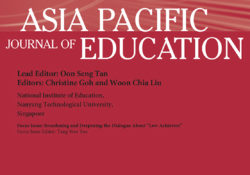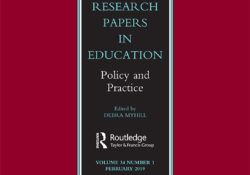eric.ed.gov har udgivet: Today, being confident and having a sound understanding of mathematics is critical in an age of STEM. Teachers must play in important role in seeing that all students display their confidence in their ability to do mathematics. This paper explains the process of using bibliotherapy when teaching mathematics to address both the math anxious or the math gifted student to build more math confidence in a STEM world. Often gifted students of mathematics can be made to feel bad by their peers just because they know mathematics and things come easy to them. Today there are many students in school that have math anxiety. Children’s and adolescent literature has been recognized now as a means to teaching mathematics to students through the use of stories to make… Continue Reading →
Like this:
Like Loading...
eric.ed.gov har udgivet: This study employed latent class cluster analysis to explore students’ perceptions of what aspects of mathematical literacy, composed of mathematics competencies and attitudes, teachers should focus on. The sample included 1,219 Taiwanese senior high school students and 59 mathematics teachers. Three profiles were identified for mathematics competence, which were characterized as comprehensive, test-oriented, and limited thought-oriented. Regarding mathematics attitudes and mathematics learning attitudes, three profiles were identified and characterized as: broad, math-interior oriented, and mind-focused. Students and teachers differed in their perceptions on the importance of some aspects of mathematical literacy. [For the complete proceedings, see ED597799.] Link til kilde
Like this:
Like Loading...
eric.ed.gov har udgivet: In this article, we report from a group (N=98) of students from two campuses of one Finnish university, on their study habits, and to what extent they use different kinds of learning materials in university mathematics courses. Our results show that the older students are more communicative with their teachers, whereas the younger students ask for help more often from fellow students. The sociomathematical norms that constitute the local study culture have a significant impact on the study habits and on the use of learning materials. For example, the use of videos and studying lecture materials before the lectures were clearly more usual at one campus than at the other. We also found some significant differences between the groups that are based on the study programmes. The… Continue Reading →
Like this:
Like Loading...

tandfonline.com har udgivet en rapport under søgningen “Teacher Education Mathematics”: ABSTRACT ABSTRACT Inclusive education (IE) has the potential to improve special education needs (SEN) students’ learning outcomes, but IE requires teachers receive adequate training to be effective. We introduce an approach to pre-service teacher preparation using experiential learning in an informal learning environment to educate beginning teachers about effective science teaching for SEN students. Using data collected from observations, survey, interviews, and autobiographical reflections, we explored how teachers’ engagement in an informal teaching experience impacted their perceptions about SEN students, their beliefs about the value of teaching science to SEN students, and their beliefs about their future responsibilities to support SEN students in inclusive classrooms. Findings expand our understanding of how to prepare new science teachers to improve science learning… Continue Reading →
Like this:
Like Loading...
eric.ed.gov har udgivet: Measures of teachers’ “value added” to student achievement play an increasingly central role in k-12 teacher policy and practice, in part because they have been shown to predict teachers’ long-term impacts on students’ life outcomes. However, little research has examined variation in the long-term effects of teachers with similar value-added performance. In this study, we investigate variation in the persistence of teachers’ value-added effects on student achievement in New York City. We separate persistent effects into general effects that improve both the subject taught (math or English language arts (ELA)) and the other area of measured achievement and subject-specific effects which improve only the subject taught. Two findings emerge. First, a teacher’s value-added to ELA achievement has substantial crossover effects on long-term math performance. That is, having… Continue Reading →
Like this:
Like Loading...

tandfonline.com har udgivet en rapport under søgningen “Teacher Education Mathematics”: Abstract Abstract In this study, we investigated which teacher characteristics influence student proficiency development regarding fractions in Grade 5 of Dutch primary education. At least three domains of research (i.e. perspectives) on effective teaching can be distinguished: studies focusing on teachers’ background characteristics, on their knowledge and conceptions regarding the subject they are teaching and on the domain-specific and general pedagogical characteristics of their teaching. In this study, effects of the three perspectives on student fraction proficiency were examined simultaneously using multilevel analyses. Findings revealed that teachers’ age and experience in the upper grades, their pedagogical content knowledge and the degree of student participation in their lessons had positive effects. Their subject matter knowledge, quality of their concept maps and… Continue Reading →
Like this:
Like Loading...
eric.ed.gov har udgivet: This study details parents’ and students’ current thinking about math, science and technology (MST) education and their satisfaction with the existing curriculum which most experts see as vastly below world-class standards. The study finds just 25% of Kansas/Missouri parents think their children should be studying more math and science; 70% think things “are fine as they are now.” The report also explains why parents and students are so complacent in this area and what kinds of changes might be helpful in building more interest in and support for more rigorous MST courses. The findings are based on a random survey of 1,472 parents and 1,295 middle and high school students in Kansas and Missouri, probing their attitudes on math, science, and to a lesser extent, technology education.… Continue Reading →
Like this:
Like Loading...
tandfonline.com har udgivet en rapport under søgningen “Teacher Education Mathematics”: ABSTRACT ABSTRACT This study describes multilingual students’ authentic use of their first and second languages in a translanguaging science classroom, from a sociocultural perspective. The study is ethnographic, and has followed some lessons each month in a translanguaging science classroom at a primary school for three years. The observed lessons were documented by four video cameras and four audio recorders, while field notes and different types of students’ texts and other teaching materials were also collected. In order investigate how language operates, and to realise the meaning semantically, we analysed the students’ use of both first and second language to tie paradigmatic relations, and how they move in linguistic loops between languages and discourses. The results illustrate the ways in… Continue Reading →
Like this:
Like Loading...
eric.ed.gov har udgivet: An extensive body of research has demonstrated that the use in a K-12 classroom of technology, such as the Internet, computers, and software programs, enhances the learning of mathematics (Cheung & Slavin, 2013; Cohen & Hollebrands, 2011). In particular, growing empirical evidence supports that certain types of technology, such as intelligent tutoring systems and adaptive learning systems, have a positive impact on students’ academic achievement in math and their attitudes toward math (Arroyo, Burleson, Tai, Muldner, & Woolf, 2013; Ma, Adesope, Nesbit, & Liu, 2014; Pane, Griffin, McCaffrey, & Karam, 2013; Steenbergen-Hu & Cooper, 2013). These kinds of learning systems yield positive effects by providing students with personalized instruction tailored to “the pace, order, location, and content of a lesson uniquely for each student” (Enyedy, 2014, p.… Continue Reading →
Like this:
Like Loading...
eric.ed.gov har udgivet: This study investigated common features of students’ attitudes towards studying science and mathematics in comprehensive and secondary schools in three countries. Data were obtained by conducting a survey (N = 581) in Norway, Finland and Russia. A Confirmatory factor analysis (CFA) provided a model with a three-factor solution consisting of factors: the perception of the teacher, anxiety towards science and mathematics, and motivation. The results suggest that most students are motivated to study sciences and mathematics. Data analysis indicate gender differences in attitudes to students’ future studies and career plans. Most girls recognized the importance of these subjects for their future studies and careers, while boys showed more interest than girls in local career opportunities in industry. Teachers have a significant role in directing students’ attitudes toward… Continue Reading →
Like this:
Like Loading...


